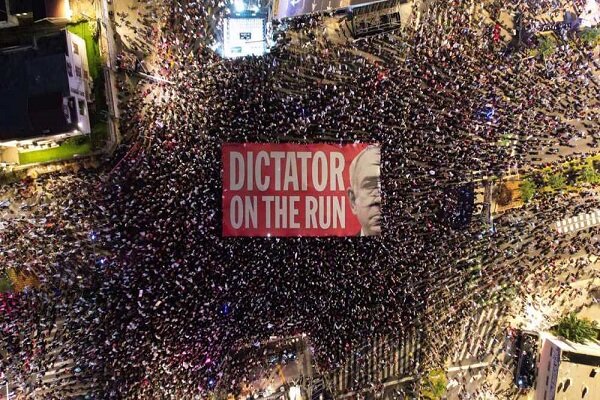The rallies were held on Saturday across more than 100 locations throughout the occupied territories, including the coastal city of Tel Aviv, as well as the occupied city of al-Quds, Modi'in, Ariel, Rosh Ha’ayin, Haifa and Rehovot.
"On Saturday night, we will all meet at Kaplan [Street in Tel Aviv] ... in a massive solidarity rally," protest organizers said in a statement ahead of the rally in the city.
Noting that the Israeli regime's extremist prime minister, Benjamin Netanyahu, “is an expert in dividing people along sectarian lines, religious vs. secular, [and] left vs. right as part of his divide and conquer strategy,” the statement added, “The economy is tumbling down and all we get is provocations..."
Dozens of demonstrators closed the Ayalon Expressway in Tel Aviv, raising protest banners and carrying torches. The regime's forces then moved in to disperse the crowd, arresting two demonstrators.
Dan Harel, a former Zionist military official, addressed the Tel Aviv rally, saying that the extremist cabinet's "actions to weaken the Supreme Court have already resulted in significant damage to the reserve units" of the regime's military, "causing a loss of readiness and operational capability."
Hundreds of protesters also held a rally in front of the residence of the head of the Israeli regime in the city of al-Quds.
The demonstrations started in January when Netanyahu's far-right cabinet unveiled its plan to radically change the structure of the regime's judiciary and its Supreme Court.
The scheme primarily seeks to prevent the Supreme Court from being able to exercise its power to strike down the decisions made by the politicians.
The protests have gained momentum since the end of July, when the Knesset passed the first bill of the overhaul plan, which restricted the court's ability to declare the cabinet's decisions "unreasonable."
Saturday's rallies came after the court deliberated petitions against the "reasonableness law." A verdict, however, is due in weeks, if not months.
Proponents of the overhaul say it helps redistribute the balance of power between the politicians and the judiciary. Its opponents, however, blame Netanyahu for trying his hand at a power grab. They say the premier, who is on trial in three corruption cases for receiving bribe, fraud, and breach of trust, is also attempting to use the scheme to quash possible judgments against him.
MP/PressTV






Leave a Reply